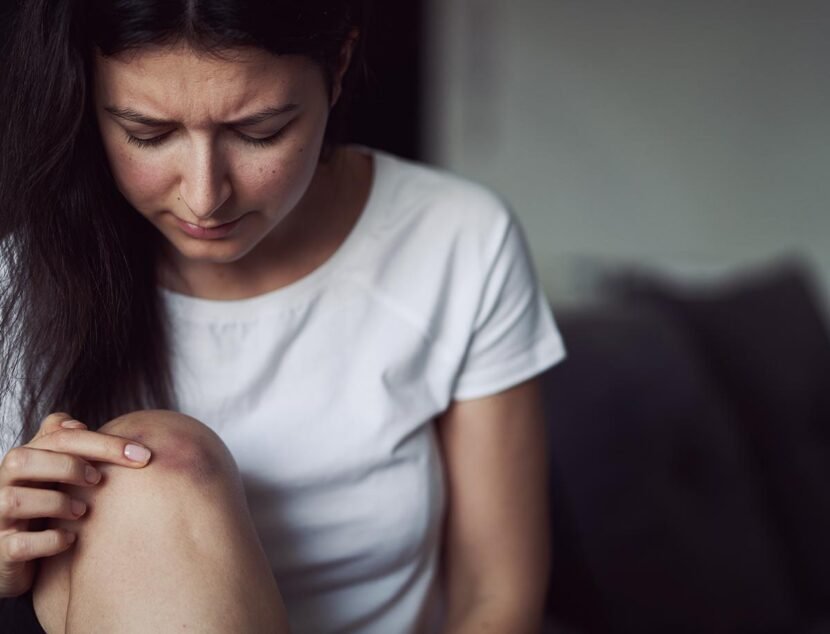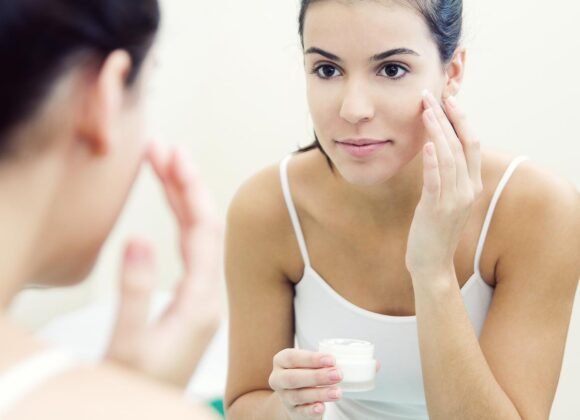Eczema, also known as atopic dermatitis, is a chronic skin condition characterized by red, inflamed, and itchy patches on the skin. It affects individuals of all ages but is most prevalent in children. Symptoms of eczema can vary among individuals but commonly include dry and sensitive skin, intense itching, red or brownish-gray patches, small raised bumps that may leak fluid when scratched, and thickened, cracked, or scaly skin.
Various factors can trigger or exacerbate eczema symptoms. These include irritants such as soaps, detergents, and disinfectants; allergens like dust mites, pet dander, and pollen; and environmental factors such as dry or cold weather. Additionally, stress, sweating, and hormonal changes can contribute to eczema flare-ups.
Managing eczema involves understanding its symptoms and triggers. Identifying specific triggers that worsen symptoms is crucial for effective management and prevention of flare-ups. Keeping a symptom journal can help in recognizing patterns and making necessary lifestyle adjustments.
Maintaining a consistent skincare routine with gentle, fragrance-free products is also beneficial in managing eczema symptoms and preventing flare-ups.
Key Takeaways
- Eczema symptoms can include dry, itchy, red, and inflamed skin, and triggers can vary from person to person.
- To soothe nighttime itching, try using a cool compress, applying moisturizer, and wearing soft, breathable clothing.
- Medications and topical solutions such as corticosteroids and antihistamines can help manage eczema symptoms.
- A nighttime skincare routine for eczema relief may include gentle cleansing, moisturizing, and using fragrance-free products.
- Managing eczema flare-ups at night can involve keeping the bedroom cool, using a humidifier, and avoiding triggers like harsh fabrics and allergens.
- Lifestyle changes such as managing stress, avoiding harsh soaps, and maintaining a healthy diet can help provide eczema relief.
- For severe eczema symptoms, it’s important to seek professional help from a dermatologist or healthcare provider for personalized treatment and management.
Eczema Relief: Tips for Soothing Nighttime Itching
Creating a Soothing Sleep Environment
One effective tip is to keep the bedroom cool and well-ventilated, as heat and sweat can exacerbate itching. Using a humidifier can also help in maintaining optimal moisture levels in the air, which can prevent the skin from drying out and becoming itchy. Additionally, wearing soft, breathable cotton pajamas and using clean, smooth bed linens can reduce friction on the skin and minimize irritation.
Soothing the Skin Before Bedtime
Another helpful tip for soothing nighttime itching is to apply a moisturizer or emollient before bedtime. Using a thick, fragrance-free moisturizer or an eczema-specific cream can help in hydrating the skin and reducing itching. It’s important to choose products that are specifically formulated for sensitive skin and free of potential irritants or allergens. Taking a lukewarm bath before bedtime and applying a moisturizer immediately after can also help in soothing the skin and relieving itching.
Reducing Stress and Promoting Relaxation
Lastly, practicing relaxation techniques such as deep breathing or meditation before bedtime can help in reducing stress and promoting better sleep, which can in turn alleviate nighttime itching. By implementing these tips and strategies, individuals with eczema can find relief from nighttime itching and improve their overall sleep quality.
Eczema Treatment: Medications and Topical Solutions
There are various treatment options available for managing eczema symptoms, including medications and topical solutions. For mild to moderate eczema, over-the-counter hydrocortisone creams or ointments can be effective in reducing inflammation and itching. These products should be used as directed by a healthcare professional to avoid potential side effects.
In some cases, prescription-strength corticosteroid creams or ointments may be necessary to control more severe symptoms. These medications work by reducing inflammation and suppressing the immune response in the skin. In addition to corticosteroids, other topical solutions such as calcineurin inhibitors may be prescribed for individuals with eczema.
These medications work by modulating the immune response in the skin and reducing inflammation. It’s important to use these medications as directed by a healthcare professional to minimize potential side effects. In some cases, oral medications such as antihistamines or oral corticosteroids may be prescribed to manage severe itching and inflammation associated with eczema flare-ups.
These medications work by reducing allergic reactions and inflammation throughout the body. It’s important to consult with a healthcare professional to determine the most appropriate treatment plan for your specific eczema symptoms.
Creating a Nighttime Skincare Routine for Eczema Relief
Creating a nighttime skincare routine tailored to eczema relief can help in soothing the skin and promoting better sleep. One essential step in a nighttime skincare routine for eczema relief is gentle cleansing. Using a mild, fragrance-free cleanser can help in removing dirt and impurities from the skin without stripping away natural oils or causing irritation.
It’s important to avoid hot water and harsh scrubbing, as these can further dry out and irritate the skin. After cleansing, applying a moisturizer or emollient is crucial for hydrating the skin and preventing dryness and itching. Choosing a thick, fragrance-free moisturizer or an eczema-specific cream can help in maintaining optimal moisture levels in the skin.
In addition to moisturizing, using topical treatments as prescribed by a healthcare professional can be an important part of a nighttime skincare routine for eczema relief. This may include applying corticosteroid creams or ointments to reduce inflammation and itching. It’s important to follow the instructions provided by your healthcare professional when using these medications to ensure their effectiveness and minimize potential side effects.
Lastly, wearing soft, breathable cotton pajamas and using clean, smooth bed linens can reduce friction on the skin and minimize irritation during sleep. By creating a nighttime skincare routine tailored to eczema relief, individuals can soothe their skin and promote better sleep.
Managing Eczema Flare-Ups at Night
Managing eczema flare-ups at night requires specific strategies to alleviate symptoms and promote better sleep. One effective way to manage eczema flare-ups at night is to apply a cold compress to the affected areas. This can help in reducing inflammation and itching, providing temporary relief from discomfort.
Additionally, using an over-the-counter antihistamine as directed by a healthcare professional can help in reducing itching and promoting better sleep during flare-ups. Another important strategy for managing eczema flare-ups at night is to avoid scratching the affected areas. Scratching can further irritate the skin and lead to more severe symptoms.
Using distraction techniques such as reading a book or listening to calming music can help in redirecting attention away from the urge to scratch. It’s also important to keep the bedroom cool and well-ventilated to prevent sweating and further irritation of the skin during flare-ups. By implementing these strategies, individuals with eczema can effectively manage flare-ups at night and improve their overall sleep quality.
Lifestyle Changes for Eczema Relief
Avoiding Triggers
One important lifestyle change for eczema relief is to avoid potential triggers that worsen symptoms. This may include avoiding harsh soaps, detergents, and disinfectants that can irritate the skin, as well as minimizing exposure to allergens such as dust mites, pet dander, and pollen.
Skincare Routine and Stress Management
Additionally, maintaining a consistent skincare routine using gentle, fragrance-free products can help in managing eczema symptoms and preventing flare-ups. Another important lifestyle change for eczema relief is to manage stress effectively. Stress can exacerbate eczema symptoms, so practicing relaxation techniques such as deep breathing, meditation, or yoga can help in reducing stress levels and promoting better skin health.
Healthy Habits for Overall Skin Health
Getting regular exercise and maintaining a healthy diet rich in fruits, vegetables, and omega-3 fatty acids can also support overall skin health and reduce inflammation associated with eczema. By making these lifestyle changes, individuals with eczema can effectively manage their symptoms and improve their quality of life.
Seeking Professional Help for Severe Eczema Symptoms
For individuals with severe eczema symptoms that do not respond to over-the-counter treatments or lifestyle changes, seeking professional help is crucial for effective management of the condition. A healthcare professional such as a dermatologist or allergist can provide a comprehensive evaluation of your symptoms and develop a personalized treatment plan tailored to your specific needs. This may include prescription-strength medications such as corticosteroids or calcineurin inhibitors to control inflammation and itching.
In some cases, phototherapy or light therapy may be recommended to reduce inflammation associated with eczema. This treatment involves exposing the skin to controlled amounts of natural or artificial ultraviolet light under medical supervision. Additionally, a healthcare professional can provide guidance on managing potential triggers that worsen your eczema symptoms and recommend appropriate lifestyle changes for relief.
For individuals with severe eczema symptoms that significantly impact their quality of life, seeking professional help is essential for effective management of the condition. By working with a healthcare professional, individuals with severe eczema can receive personalized treatment options that address their specific needs and improve their overall skin health.
FAQs
What is eczema?
Eczema is a chronic skin condition that causes the skin to become inflamed, itchy, and red. It can occur at any age and is often accompanied by other allergic conditions such as asthma or hay fever.
What are the symptoms of eczema?
The symptoms of eczema can vary, but commonly include itching, redness, dryness, and inflammation of the skin. In severe cases, the skin may also develop blisters and become thickened or scaly.
Why does eczema itch more at night?
Eczema tends to itch more at night due to a combination of factors such as increased blood flow to the skin, higher skin temperature, and the body’s natural circadian rhythms. Additionally, the lack of distractions at night can make the itching feel more intense.
How can I stop nighttime itching from eczema symptoms?
To stop nighttime itching from eczema symptoms, it is important to keep the skin moisturized, avoid triggers such as harsh soaps or detergents, and use anti-itch creams or ointments. Additionally, keeping the bedroom cool and using breathable fabrics for bedding can help reduce itching.
Are there any home remedies for relieving nighttime itching from eczema?
Some home remedies for relieving nighttime itching from eczema include taking a lukewarm bath with colloidal oatmeal, applying cold compresses to the itchy areas, and using natural moisturizers such as coconut oil or shea butter. It is important to consult with a healthcare professional before trying any home remedies.
When should I see a doctor for nighttime itching from eczema?
If the nighttime itching from eczema is severe and affecting your sleep, or if it is accompanied by signs of infection such as pus, swelling, or warmth in the affected area, it is important to see a doctor. Additionally, if over-the-counter treatments are not providing relief, a doctor can provide further guidance and prescribe stronger medications if necessary.




